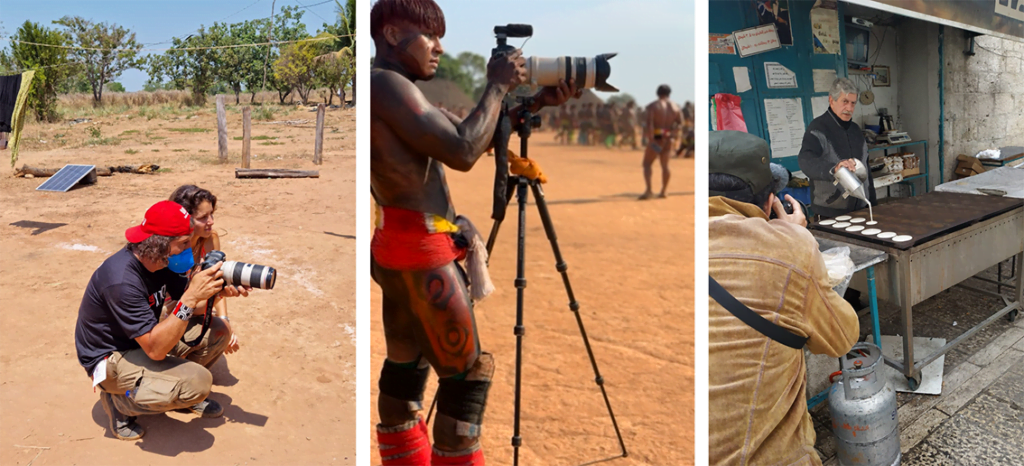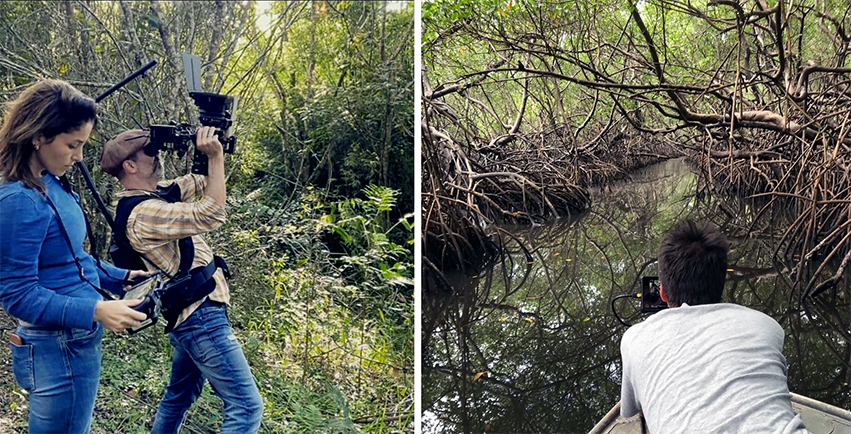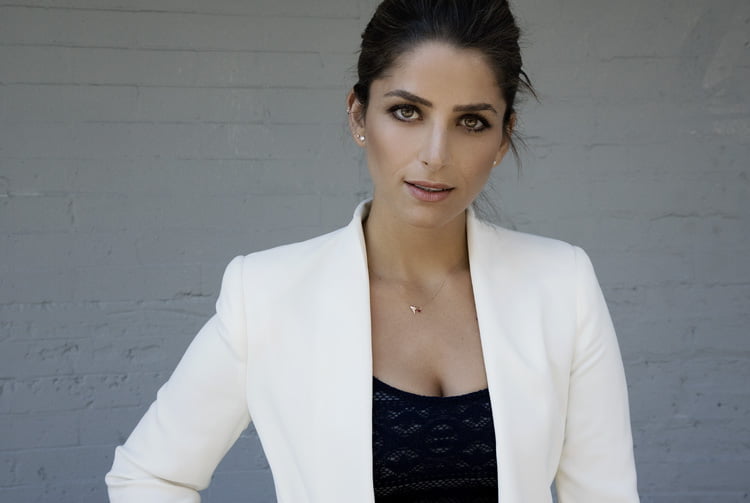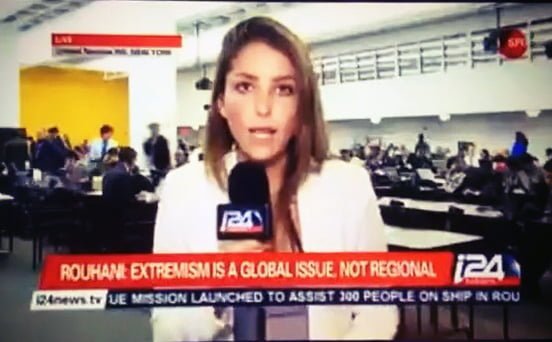Time to read: 9 minutes
Today we introduce you to Ayelet Vardi, a New York & São Paulo based filmmaker & journalist and the founder of Cinema Tribu, a boutique production company built around her humanistic and stylized approach to storytelling. Ayelet’s work is guided by her passion for global issues and desire to bring otherwise unseen stories to a global audience. She is especially attracted to narratives that revolve around human ingenuity, perseverance, and strength. Her work spans from conducting interviews and producing news pieces, to directing & producing documentaries, scripted content, and everything in between.
Ayelet’s work has been showcased by Nowness, The Washington Post, Whitewall Magazine, Amnesty International, Nobel Peace Center, and Clinton Foundation, among others.
How do you describe what you do? What is unique about it / What makes you stand out?
I am a storyteller, whether it’s in the form of a documentary, branded content, a news piece, or anything else; my objective is to tell a meaningful story, in a way that draws people in. What drives me in my work is a desire to address different issues and concerns about our world, and my goal is to create content that makes an impact on how people feel or think.
A lot of my work has focused on the power of the individual, as well as stories that are outside the mainstream. I see the beauty in small things and tend to seek out extraordinary people, showcasing their stories in an effort to demonstrate how even just one person’s efforts can be infinitely important. I also like uncovering what motivates people to do what they do and what led them to be who they are, the story behind the story. I believe my character-centered approach, combined with my visual sensibilities is what makes my work stand out – my goal is to create content that is not only meaningful but also beautiful.
What inspired you to go and do it?
I grew up in a multicultural home, at the intersection of many countries and continents. I believe this is what led me to be anthropologically curious from a young age. On top of that, my grandmother collected National Geographic magazines and I was fascinated by them; I loved learning about the different people and lifestyles that existed across the world. It was a natural progression from there – I realized I wanted to bring a part of that awareness & curiosity to people who might not have access to those types of experiences & mindsets. Through my experience in journalism, I started to figure out ways to make creating different kinds of content a bigger and bigger part of my life. Ultimately, what first inspired me to get started is what continues to motivate me everyday – continuing to learn from people & having the opportunity to share their unique experiences with others, in the hope of bringing people together under a holistic mindset of humanity.

What is the most challenging aspect of your work or the biggest challenge you have dealt with and how did you overcome it?
There is always a new challenge in my line of work, but one of the biggest ones has been entrepreneurship and what it means in this industry. Coming from a background in journalism, learning how to navigate the development process and its ebbs and flows has been an ongoing challenge. Things happen a lot faster in news – stories get pitched, reported on, and printed in a fraction of the time it takes to develop almost any scripted or documentary project. I’ve learned that one has to have patience, vision & perseverance in order to keep projects on track. Most of all, it’s about not losing sight of the big picture and ultimate goal, and experimenting with different ways to make it a reality.
What is your current Mount Everest? What would you love to create in the world?
I am currently in the beginning stages of my first feature-length scripted project. It’s inspired by true events and tackles issues around international adoption and child trafficking. Since I’ve only been directing documentaries so far, it is a true Mount Everest. That being said, we just had Academy Award Winner Guillermo Arriaga join our team, which is an affirming milestone.

What are the words that describe who you are in your essence and do you feel they are being expressed through your work?
If I had to sum it up in one word, I’d say it would be curiosity. I am an innately curious person.
People tend to be caught up in their own lives, and are sometimes afraid to shift mindsets, try new things, and be open to others. Curiosity opens so many doors and allows people to not only be more connected but also conceive of more possibilities & alternatives. I believe that curiosity is a gateway to knowledge and empathy. If I can play a small part in opening up a door and making even a small difference in someone’s mindset, inspiring them to be curious and consider something they otherwise wouldn’t, my job is done.
What is the most inspiring thing that happened to you as a result of iDiscover?
There was an important tool that I gained as a result of the programme, which is essentially: the greater the challenge, the greater the reward. This idea has set me on a path of understanding that shortcuts may not always lead to the most fulfilling outcome. It’s not to say that shortcuts are to be avoided at all costs but instead has made me accept that challenges are an important part of the process. One learns from them, and grows from them, and sometimes finding a way around the challenge won’t give you as good a result as if you face it straight on.
What do iDiscover and its community mean to you?
I met a lot of interesting people in the programme, and I appreciated the types of questions that came up and how unafraid people were to evolve and seek new paths. I kept in touch with some of them, and one person, in particular, has been a great source of inspiration.
What is your most sacred daily/weekly/monthly ritual or performance hack that really works for you?
I actually have two daily reset rituals – one for the morning and one for the evening. They set a framework around my day so that I can move through it deliberately and in the present. In the morning I go for a run and plan my day, the physical activity spurs me into action and activity. In the evening, before going to bed, I take a shower and light a candle, and think of the things I am lucky to have in my life. This prepares me for rest – I‘m very conscious of my dreams as a part of my day-to-day life, so setting my intentions for my waking hours is just as important as preparing for sleep.
Best travel tip or secret location to share with us?
To me, traveling is nourishment for the mind & soul. My travel tip is to keep a diary. Sometimes it’s hard to tell at the moment how much an experience is affecting us, and documenting things in retrospect is an amazing tool to both facilitate that process, and truly appreciate it.
What is your favourite quote or a question you want to leave us with?
“And above all, watch with glittering eyes the whole world around you because the greatest secrets are always hidden in the most unlikely places. Those who don’t believe in magic will never find it.” – Roald Dahl.
With all the challenges we encounter on a daily basis, we have to believe in magic in order to find it. My quest is to look for magic whenever & wherever I can. In a certain way, in order to achieve anything that may seem impossible one has to ignore common sense and focus on the magic. It’s the only way.
You can check out Ayelet’s inspiring documentaries on the CinemaTribu website.


